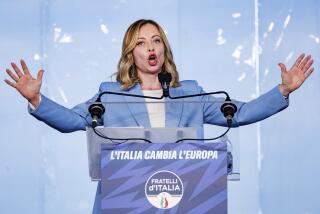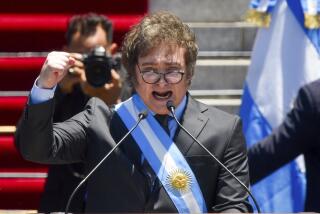Profile : Italian Tycoon Tackles Business of Ruling : He owns everything from TV stations to a soccer team. But critics ask if his Midas touch can apply to a nation.
- Share via
ROME — Billionaire entrepreneur Silvio Berlusconi leaped improbably to power this spring as a new political product that disgruntled Italian voters would buy. Now the question is whether he can run a government as successfully as he has run his businesses.
Does Berlusconi really clean better? Can he build a fresher, brighter Italy?
Tune in later. First, the man who has everything must establish credibility as a national leader.
The media mogul turned prime minister is a political rookie on the national stage, and so are most members of Italy’s new Parliament. Nearly all of the two dozen Cabinet officers are making their ministerial debut, and inexperience is the common denominator as the 57-year-old Milan tycoon launches the first frankly conservative government in Italy since World War II. Berlusconi must:
* Put forward specific initiatives to address urgent national needs--from unemployment to organized crime, from tax reform to health care.
* Convince skeptical Italians that he will not abuse power to further his own economic interests.
* Harness fractious neo-fascists and federalist allies making their debut in government in order to convince Italians--and Western allies--that they are truly committed to democracy and national cohesion.
The demands on Italy’s 53rd postwar government are apparent, as are the resentment and uncertainties Berlusconi has roused at the head of a new party with the catchy name Forza Italia (Go, Italy).
“This strange coalition of neo- and post-fascists and Forza Italia formed in two months directly from a large business (and) governed by one man like a business . . . is not reliable as a democratic European government,” complained leftist Sen. Eduardo Ronchi, who voted against the new regime’s narrow confirmation by the Italian Senate last week.
A dynamic risk-taker who is one of Europe’s richest men, Berlusconi seems undaunted by the tasks and unimpressed by critics.
“It’s quite common for politicians to go into business. Why is there such a negative attitude about a businessman becoming a politician? Everything I have done in business has been transparent with respect to the law,” he said last week.
Berlusconi is a free-market man; economically he would be at home with Margaret Thatcher or Ronald Reagan. His two main coalition partners, by contrast, are preoccupied less with economics than with the structure of government and society:
* The Northern League, under Sen. Umberto Bossi, seeks a decentralized Italy that would devolve into three regional, largely self-governing republics.
* The National Alliance, headed by Gianfranco Fini, is the direct descendant of Benito Mussolini’s Fascist Party. Claiming to be “post-fascist,” it speaks evocatively of law, order and morality. Like the Northern League, the National Alliance wants strict controls on immigration.
*
The thrust of the ruling triumvirate represents a major shift for Italy. The first 52 governments after World War II were dominated by the centrist Christian Democrats. They preached social consensus and built a major state role in the economy, recently diminished by a privatization scheme that Berlusconi will continue.
One price for a closed circle of power that became a partitocrazia --an aristocracy of the ruling parties--was inefficiency and ever-greater government deficits: The parties created too many do-little government jobs for too many supporters.
Another price was massive corruption. As demands of ever-growing party superstructures required more money, illegal payoffs to political parties for government contracts became institutionalized.
An investigation that began in Milan in 1992 has now spread to virtually every major city.
One London bank estimates payoffs of $10 billion to $20 billion in 12 years, and some Italian magistrates say the total is even higher.
The probes have thus far implicated five former prime ministers, seven former party leaders, 39 former ministers and more than 2,000 leading businessmen and managers, including Berlusconi’s brother.
Careful to select ministers untainted by any hint of impropriety, Berlusconi has vowed to give magistrates a free hand to pursue their investigations into official corruption.
He has also pledged to continue the government’s campaign against the Mafia, a crackdown that had made unprecedented progress in the last two years but is now under counterattack.
Last week, Berlusconi’s new Interior minister, Roberto Maroni, rushed to the Mafia stronghold of Sicily to reassure small-town leftist mayors who have been targets of firebombings and other leave-us-alone warnings from the Mafia.
Voters who carried Berlusconi to office are mainstream Italians fed up with crime and corruption and intrigued by the economic promises of a man who has shown that he can make his ideas work in the marketplace.
Berlusconi says, with few specifics so far, that he will attack an unemployment rate of 11.3% by creating 1 million jobs over the next 30 months.
At the heart of free-market legislation now being prepared will be tax relief for entrepreneurs who expand production and incentives to hire young workers.
The new premier has promised tax reform as well, designed to slash the jungle of complicated, oft-evaded legislation.
If Berlusconi brings economic good times back to a country listlessly mired in recession, among the large beneficiaries will be Fininvest, his many-tentacled and heavily indebted business empire.
Italy’s new prime minister is a short, balding, impeccably tailored and tightly controlled man. He has scant patience with criticism and is an articulate, if not riveting, speaker.
From his early days as a scrambling real estate developer in Milan, he has become a man of many parts: He owns Italy’s biggest advertising agency, three national television channels, magazines, insurance companies and Europe’s champion soccer team, the powerhouse Milan.
But the new prime minister’s enormous wealth and newfound political power do not endear him to his political opponents.
“There is incompatibility when a head of a government is also head of a large business. Democracy is not served by the coincidence of these two roles. There needs to be a separation,” complained Sen. Cesare Salvi of the Democratic Party of the Left, the former Italian Communist Party.
That Berlusconi named his personal lawyer as defense minister and a political talk show host from one of his TV channels as minister for relations with Parliament does not inspire great confidence either.
Berlusconi has placed the management of his holdings in the hands of longtime aide Fedele Confalonieri and named three guarantors to ensure that he does not mix public and private roles.
“The constitution and the law are sufficient for those who know how to apply them,” Forza Italia Sen. Enrico la Loggia declared of the remedies available to control any transgressions.
Italy’s new leader presents his government as representing a continuity of Rome’s global interests.
Indeed, a fan of President Clinton’s, he is more at home with Italy’s partnerships with the United States and Western Europe than some Europeans are with his government. That owes to the presence in his Cabinet of five neo-fascist ministers.
Under Fini, too young at 42 to have more than schoolbook memories of Mussolini, the National Alliance portrays itself as a capitalist and democratic right-wing party.
Fini, though, sends shivers across Europe when he says that Mussolini was the greatest statesman of the century.
*
Berlusconi entered politics in the first place because he feared victory by the former Communist Party in the national elections of March.
Last week he forcefully denounced xenophobia, racism and anti-Semitism in a parliamentary speech.
Still, many Italians are not as sanguine as their new prime minister about the presence of neo-fascists in government.
So a rich man more accustomed to giving orders than to building a consensus asks for time and understanding as he takes the reins of political power.
“Judge us by facts and not prejudice,” Berlusconi implored.
Name: Silvio Berlusconi
* Title: Italian Prime Minister
* Age: 57
* Profile: University of Milan, one of Italy’s richest men, he is the owner of Finivest group with interests in TV stations, real estate, insurance and financial services, a cinema chain and a football club.
* “It’s quite common for politicians to go into business. Why is there such a negative attitude about a businessman becoming a politician? Everything I have done in business has been transparent with respect to the law.”
More to Read
Sign up for Essential California
The most important California stories and recommendations in your inbox every morning.
You may occasionally receive promotional content from the Los Angeles Times.













